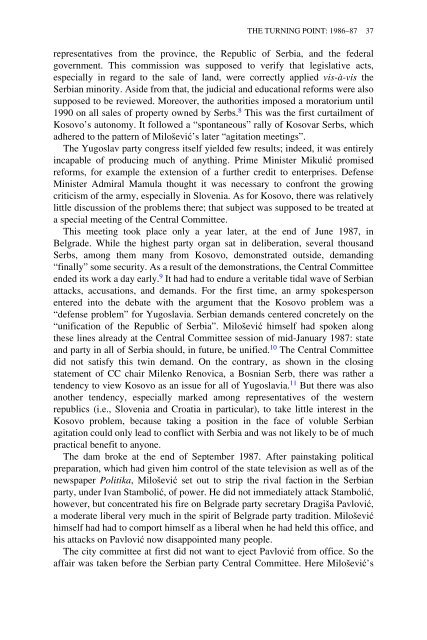Yugoslavia: A History of its Demise - Indymedia
Yugoslavia: A History of its Demise - Indymedia
Yugoslavia: A History of its Demise - Indymedia
You also want an ePaper? Increase the reach of your titles
YUMPU automatically turns print PDFs into web optimized ePapers that Google loves.
THE TURNING POINT: 1986–87 37<br />
representatives from the province, the Republic <strong>of</strong> Serbia, and the federal<br />
government. This commission was supposed to verify that legislative acts,<br />
especially in regard to the sale <strong>of</strong> land, were correctly applied vis-à-vis the<br />
Serbian minority. Aside from that, the judicial and educational reforms were also<br />
supposed to be reviewed. Moreover, the authorities imposed a moratorium until<br />
1990 on all sales <strong>of</strong> property owned by Serbs. 8 This was the first curtailment <strong>of</strong><br />
Kosovo’s autonomy. It followed a “spontaneous” rally <strong>of</strong> Kosovar Serbs, which<br />
adhered to the pattern <strong>of</strong> Milošević’s later “agitation meetings”.<br />
The Yugoslav party congress <strong>its</strong>elf yielded few results; indeed, it was entirely<br />
incapable <strong>of</strong> producing much <strong>of</strong> anything. Prime Minister Mikulić promised<br />
reforms, for example the extension <strong>of</strong> a further credit to enterprises. Defense<br />
Minister Admiral Mamula thought it was necessary to confront the growing<br />
criticism <strong>of</strong> the army, especially in Slovenia. As for Kosovo, there was relatively<br />
little discussion <strong>of</strong> the problems there; that subject was supposed to be treated at<br />
a special meeting <strong>of</strong> the Central Committee.<br />
This meeting took place only a year later, at the end <strong>of</strong> June 1987, in<br />
Belgrade. While the highest party organ sat in deliberation, several thousand<br />
Serbs, among them many from Kosovo, demonstrated outside, demanding<br />
“finally” some security. As a result <strong>of</strong> the demonstrations, the Central Committee<br />
ended <strong>its</strong> work a day early. 9 It had had to endure a veritable tidal wave <strong>of</strong> Serbian<br />
attacks, accusations, and demands. For the first time, an army spokesperson<br />
entered into the debate with the argument that the Kosovo problem was a<br />
“defense problem” for <strong>Yugoslavia</strong>. Serbian demands centered concretely on the<br />
“unification <strong>of</strong> the Republic <strong>of</strong> Serbia”. Milošević himself had spoken along<br />
these lines already at the Central Committee session <strong>of</strong> mid-January 1987: state<br />
and party in all <strong>of</strong> Serbia should, in future, be unified. 10 The Central Committee<br />
did not satisfy this twin demand. On the contrary, as shown in the closing<br />
statement <strong>of</strong> CC chair Milenko Renovica, a Bosnian Serb, there was rather a<br />
tendency to view Kosovo as an issue for all <strong>of</strong> <strong>Yugoslavia</strong>. 11 But there was also<br />
another tendency, especially marked among representatives <strong>of</strong> the western<br />
republics (i.e., Slovenia and Croatia in particular), to take little interest in the<br />
Kosovo problem, because taking a position in the face <strong>of</strong> voluble Serbian<br />
agitation could only lead to conflict with Serbia and was not likely to be <strong>of</strong> much<br />
practical benefit to anyone.<br />
The dam broke at the end <strong>of</strong> September 1987. After painstaking political<br />
preparation, which had given him control <strong>of</strong> the state television as well as <strong>of</strong> the<br />
newspaper Politika, Milošević set out to strip the rival faction in the Serbian<br />
party, under Ivan Stambolić, <strong>of</strong> power. He did not immediately attack Stambolić,<br />
however, but concentrated his fire on Belgrade party secretary Dragiša Pavlović,<br />
a moderate liberal very much in the spirit <strong>of</strong> Belgrade party tradition. Milošević<br />
himself had had to comport himself as a liberal when he had held this <strong>of</strong>fice, and<br />
his attacks on Pavlović now disappointed many people.<br />
The city committee at first did not want to eject Pavlović from <strong>of</strong>fice. So the<br />
affair was taken before the Serbian party Central Committee. Here Milošević’s
















